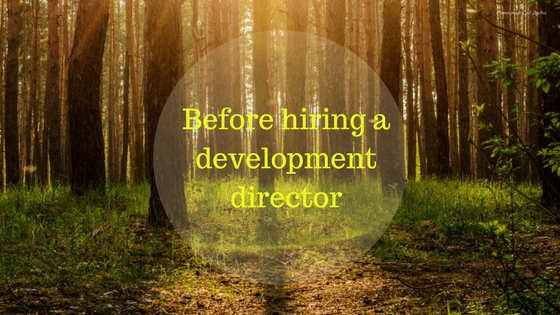
Recently I was talking with a board member of a nonprofit who was considering hiring a development director. This board member has been on several nonprofit boards, and worked on some capital campaigns as well. So, imagine my surprise when he said:
“Our executive director is wonderful but doesn’t have a background in fundraising. Or much time to focus on it. Most of the board don’t have friends with money. Most of them are uncomfortable with fundraising. So, we need to hire a first-rate fundraiser. But we don’t have a lot of money to hire one.”
Sure, there is plenty of evidence that small nonprofits have a hard time finding and keeping skilled development directors. Why? They say it’s because they don’t have the money to pay competitive salaries.
But is the issue salary?
No, the issue is that they need:
- a fundraising plan
- to hire a development coordinator first that can ASSIST the executive and board with the activities that support fundraising.
- a fundraising consultant to help them think through the strategy they need through a two-year plan tied to the strategic plan.
- a budget for some software tools, and creation of donor materials.
Unfortunately, the Executive Director and Board often don’t see it as bringing on expertise to help them get better at their role in fundraising: they see hiring a development director as a way to avoid or minimize their involvement even further.
Many Executive Directors are program experts and either loathe fundraising or simply avoid it other than grants. That’s an attitude problem that is indefensible. If you are passionate about your mission, you’re eager to talk with donors and funders about how you’re achieving it.
In our conversation, I learned that this same executive director is willing to write grants, but sees the Board as the one who should be doing individual fundraising. Based on what? Is there a plan? A donor list and giving history? Donor communication pieces? A case for support?
My advice to this board member was this:
- Put together a job description for the development coordinator (or associate). Hint: You need realistic performance expectations on the part of the executive director and board as what can reasonably happen if it’s a one-person development office.
- Hire a fundraising consultant to help create a plan.
- Get a commitment from the executive director to grow skills in this vital area.
- Give the development consultant permission to have input on budgets and fundraising goals. The consultant will be more reasonable on what is possible to raise over time and based on the organization’s strategic plan.
- Invest in software systems and infrastructure to support fundraising. And you might need time to get all that giving history changed over from a spreadsheet or a database.
 Most importantly, you need an understanding among all staff (and that includes program people) that fundraising and relationship building are part of everyone’s job! It’s not the responsibility of one person. Fundraising is important programmatic work.
Most importantly, you need an understanding among all staff (and that includes program people) that fundraising and relationship building are part of everyone’s job! It’s not the responsibility of one person. Fundraising is important programmatic work.
Newsflash: hiring a development director still won’t relieve you of fundraising
Even at small organizations with budgets around $600,000, hiring a development director won’t relieve the board and ED of fundraising. If you already have a development coordinator, a good development director will be able to create more opportunities for board engagement in fundraising, rather than lessening the board’s involvement. What I see is that too many executive directors and boards have unrealistic expectations about what a development director could accomplish without a team and the right tools in place.
If the following things are in place, a development director can be successful:
· compelling mission and a strong strategic plan
· the leadership, vision, and skill of the executive director;
· an engaged, committed, and high-functioning board
· development tools that are effective and efficient to use
· support staff that can manage the details (fundraising is all about the details)
· a strong working partnership between the board and the executive director.
Be smart. Start small and grow. Prepare for bringing on a development director. And when you do, know that the fundraising work you do will really begin to pay dividends that lead to greater impact.




